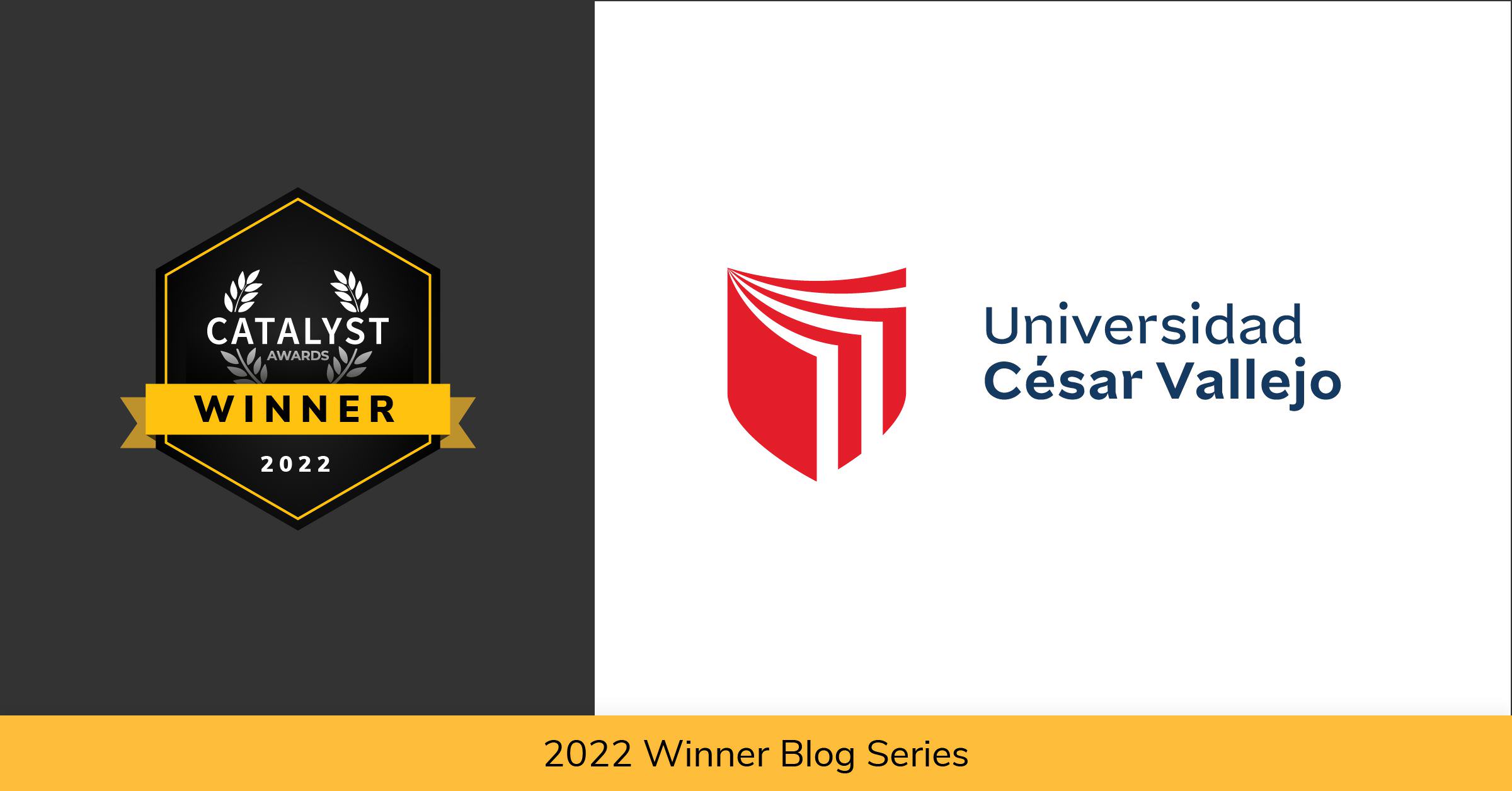
Catalyst Awards Blog Series: Vallejo Goes with You — Program to Ensure the Achievement of Graduation Competencies of UCV Students
The Catalyst Awards program recognizes innovation and excellence in our global community of practice. In this blog series, a selection of 2022 award-winning institutions from across the globe share their success stories and best practices.
This post was guest authored by Lily Doris Salazar Chávez, director of the Academic Innovation Center at Universidad César Vallejo, Peru.
Universidad César Vallejo is a 2022 Catalyst Award winner in the “Assessment & Institutional Effectiveness” category.
The project Vallejo goes with you, entitled “Program to Ensure the Achievement of Graduation Competencies of UCV Students,” won the Catalyst Award in the category of Assessment & Institutional Effectiveness. Its purpose was to ensure that students achieve 100% of their graduation competencies at the end of their studies.
The #Vallejogoeswithyou project
The #Vallejogoeswithyou program evaluates the achievement level of graduation competencies in each academic semester and has four stages.
Stage 1: Planning
This is where the challenge begins. Work commissions are formed by each professional school to review the curriculum and the specific and generic competencies. The core curricular experience in each cycle is determined, and the evidence or product that will be used to evaluate the achievement of the graduate's competencies is established. The design, programming, and alignment of the rubric are a fundamental part of the process.
Stage 2: Execution
The teachers of the core curricular experience for each semester have an important task in evaluating the evidence or product with the rubric programmed in Blackboard® Learn. Two evaluations are carried out in each academic semester: diagnostic evaluation for the first unit and final evaluation for the third one. Based on the results of these evaluations, the most appropriate improvement actions are programmed, such as workshops for students who attained low or medium achievement levels in the competencies, as well as students who have more difficulty achieving them.
Stage 3: Project follow-up and monitoring
The average duration of a professional degree course is five years, and the project follows the student throughout that time.
During the follow-up, the programming, alignment, and application of the rubrics are verified in accordance with the established dates. Actions are taken to update, rectify, and resolve any incidents that may arise in the program.
Stage 4: Assessment
At the end of the five years of uninterrupted follow-up, and after having completed the course, the level of achievement of the graduate's profile competencies are assessed. The objective of the academic team is that 100% of the graduates achieve the graduation competencies by the end of their studies.
Achievements obtained from the project
- It provides detailed and systematized data that allows monitoring the achievement level of students' specific and generic competencies concurrently throughout the course of study.
- It is the only concurrent monitoring, assessment, and accompaniment program.
- It enables decision-making to implement improvement measures, such as workshops to supplement and strengthen levels for those who obtain low and medium performance grades.
- It allows students to be protagonists of their learning process and to assume a proactive and responsible attitude to improve and achieve the competencies of their professional profile.
Results of the project
The project is based on the evaluation of one core curricular experience per semester in two stages, during the first and third units.
In the first unit, it was observed that 18% of the students achieved a low level, 50% a medium level, and 32% a high level. After undertaking workshops to strengthen levels, the evaluation rubric was applied in the third unit, with the result that 0% were at a low level, 52% at a medium level, and 48% at a high level.
Thus, there was an increase of 16% of students to the high level and no student in the low level, showing a significant improvement in the achievement of competencies in the academic course.
Application of Anthology and/or Blackboard Learn solutions in the project
The Blackboard Learn platform is an online learning space in which evaluation activities and rubrics can be programmed.
In the programming of rubrics, the evaluation criteria are aligned with the competencies of the graduate profile to know the results. This makes it easier for the teacher to provide immediate, personalized feedback and for the student to reflect on the results obtained regarding the graduation competencies.
The data from the grade book allows the teacher to analyze the results individually and in groups in order to rethink their methodological strategies and reinforce the competencies in which the students have obtained a low or medium level, and assist them through workshops to strengthen and supplement levels.
Conclusion
- The program contributed to a significant improvement in the achievement of competencies in the academic course.
- The results of the program ensure objective and reliable information about the assessment results of the graduation competencies of the students at the end of the course.
- The Blackboard Learn platform is an online learning space where evaluation activities and rubrics can be programmed.
For more information on the program, visit Catalyst Awards. Learn more about our 2022 Catalyst Award winners and their stories.